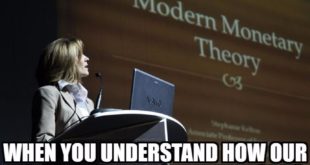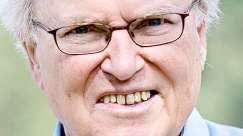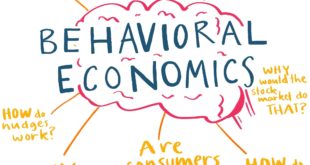from Lars Syll We all heterodox economists who have chosen the road ‘less traveled by’ know that this choice comes at a price. Fewer opportunities to secure ample research funding or positions at prestigious institutes or universities. Nevertheless, yours truly believes that very few of us regret our choices. One doesn’t bargain with one’s conscience. No amount of money or prestige in the world can replace the feeling of looking in the mirror and liking what one sees. My friend Axel...
Read More »The Road Not Taken
The Road Not Taken We all heterodox economists who have chosen the road ‘less traveled by’ know that this choice comes at a price. Fewer opportunities to secure ample research funding or positions at prestigious institutes or universities. Nevertheless, yours truly believes that very few of us regret our choices. One doesn’t bargain with one’s conscience. No amount of money or prestige in the world can replace the feeling of looking in the mirror and...
Read More »When usefulness is more important than precision
When usefulness is more important than precision This is a bit like a physicist saying, “Throwing a cricket ball at a window doesn’t cause it to break. Rather, giving an object of approximately spherical shape with a given density a certain velocity in a fluid medium of a certain density and viscosity within a gravitational field of a certain magnitude causes a silicone-based compound in a certain quantity of certain dimensions with certain reflective and...
Read More »Wenn die Logik des Haushalts nicht die des Staates ist
Wenn die Logik des Haushalts nicht die des Staates ist Im Februar 2024 kündigte die französische Regierung ein Sparpaket von 10 Mrd. € an, um das fiskalische Defizit zu senken. Politico berichtete: “Wir verdienen weniger, wir geben weniger aus”, sagt Finanzminister Bruno Le Maire. Diese Logik gilt zwar für einen Haushalt, aber nicht für eine nationale Regierung wie die von Frankreich. Warum? … Wenn Frankreich die Staatsausgaben kürzt und die anderen...
Read More »Milton Friedman – economic visionary or scourge of the world?
The Spectator, 13 January 2024 Monetarism, with which his name is associated, has long defined economic policy. But what would Friedman have made of the banking collapse, so soon after his death in 2006? The Keynesian economist Nicholas Kaldor called Milton Friedman one of the two most evil men of the 20th century. (Friedman was in distinguished company.) The ‘scourge’ he inflicted on the world was monetarism, a product of what Kaldor called Friedman’s Big Lie – of which more later....
Read More »Britain’s Illusory Fiscal Black Hole
Project Syndicate 18th of September, 2024 “Shortly after taking office, the United Kingdom’s new Labour government announced the discovery of a massive shortfall in public finances. While much of the political debate has centered on the size of this fiscal hole, the real culprit is the set of arbitrary rules that British governments have imposed on themselves since 1997.“ LONDON – Shortly after taking office, the United Kingdom’s new Labour government announced the discovery of a...
Read More »What economics can learn from epidemiology
What economics can learn from epidemiology In mainstream economics nowadays there seems to be a broad consensus that one somehow can establish general truths about things by simply generalizing from lots of individual RCTs. But as is well-known among philosophers of science, this kind of inference, based on induction by simple enumeration, is highly flawed. And there are alternatives: The striking feature of paradigmatic epidemiology is that evidence comes...
Read More »Assar Lindbeck — a Hayekian neoliberal
Assar Lindbeck — a Hayekian neoliberal Lindbeck’s interactions with the New Left and Neo-Malthusians, focusing on issues like environmental sustainability and social justice, exemplify how his authorship developed in an antagonistic context against his interlocutors. He used Hayekian epistemology to counter the grievances of his adversaries, arguing that market mechanisms were superior in addressing environmental and social challenges that he...
Read More »Are we all behavioural economists now?
Are we all behavioural economists now? While neoclassical economists cannot consistently incorporate behavioral factors into their models, there is nothing in behavioral economics that makes the use of neoclassical theory illegitimate. To the contrary … behavioral economists have consistently advocated using neoclassical theory for all sorts of purposes. By and large, they treat neoclassical models and theories as heuristic devices or analytical tools,...
Read More »Varieties of capitalism and societal happiness: theory and empirics
This paper investigates the impact of different varieties of capitalism (VoC) on societal happiness. It begins with a critique of Neoclassical welfare economics which emphasizes Pareto optimality, and it argues for focusing on reported societal happiness. The paper identifies five VoC. Using a sample of twenty-six high-income countries drawn from the 2020 World Happiness Report, […]
Read More » Heterodox
Heterodox







